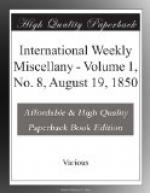* * * * *
JAMES WRIGHT, author of the Philosophy of Elocution and other works chiefly of a religious character, died at Brighton, England, on the 9th of July, aged 68.
* * * * *
SIR THOMAS WILDE, who has just been promoted to the Woolsack, as Baron Truro, we learn from the Illustrated News, was born in 1782. After practicing as an attorney, he was called to the bar by the Honorable Society of the Inner Temple, the 7th February, 1817. He joined the Western Circuit, and soon rose into considerable practice. His knowledge of the law, combined with his great eloquence, made him one of the most successful advocates of his time. He was for many years the confidential and legal adviser of the late Alderman Sir Matthew Wood, and his connection with that gentleman caused him to be engaged as one of the senior counsel for the Queen on the celebrated trial of Queen Caroline. Though surrounded by rivals of the highest eminence and the brightest fame, Wilde always stood among the foremost, and obtained briefs in some of the greatest causes ever tried. For instance, he was engaged on the winning side in the famous action of Small v. Atwood, in which his fees are said to have amounted to something enormous. In 1824 he became a sergeant-at-law; and he was appointed King’s Sergeant in 1827, and Solicitor-General in 1839, when he received the honor of knighthood. In 1841 he first became Attorney-General; and after a second time holding that office, he succeeded the late Sir Nicholas Conyngham Tindal, as Lord Chief Justice of the Common Pleas. His recent appointment as Lord Chancellor places him at the very summit of his profession.
* * * * *
[FROM THE LONDON LADIES’ COMPANION.]
THE MORNING SONG.
BY BARRY CORNWALL.
A new “English Song,” by Barry Cornwall, is now—more’s the pity—a too rare event in the musical year. We are at once doing our readers a pleasure, and owning a welcome kindness, in publishing, by the author’s permission, these words, set by M. Benedict, and sung by Madame Sontag.
The world is waking into light;
The dark and sullen night
hath flown:
Life lives and re-assumes its might,
And nature smiles upon her
throne.
And the Lark,
Hark!
She gives welcome to
the day,
In a merry, merry, lay,
Tra la!—lira, lira,
lira, la!
Soft sounds are sailing through the air;
Sweet sounds are springing
from the stream;
And fairest things, where all is fair,
Join gently in the grateful
theme.
And the Lark,
&c., &c.
The morn, the morn is in the skies;
The reaper singeth from the
corn;
The shepherd on the hills replies;
And all things now salute
the morn,
Even the Lark,
&c., &c.
* * * * *




